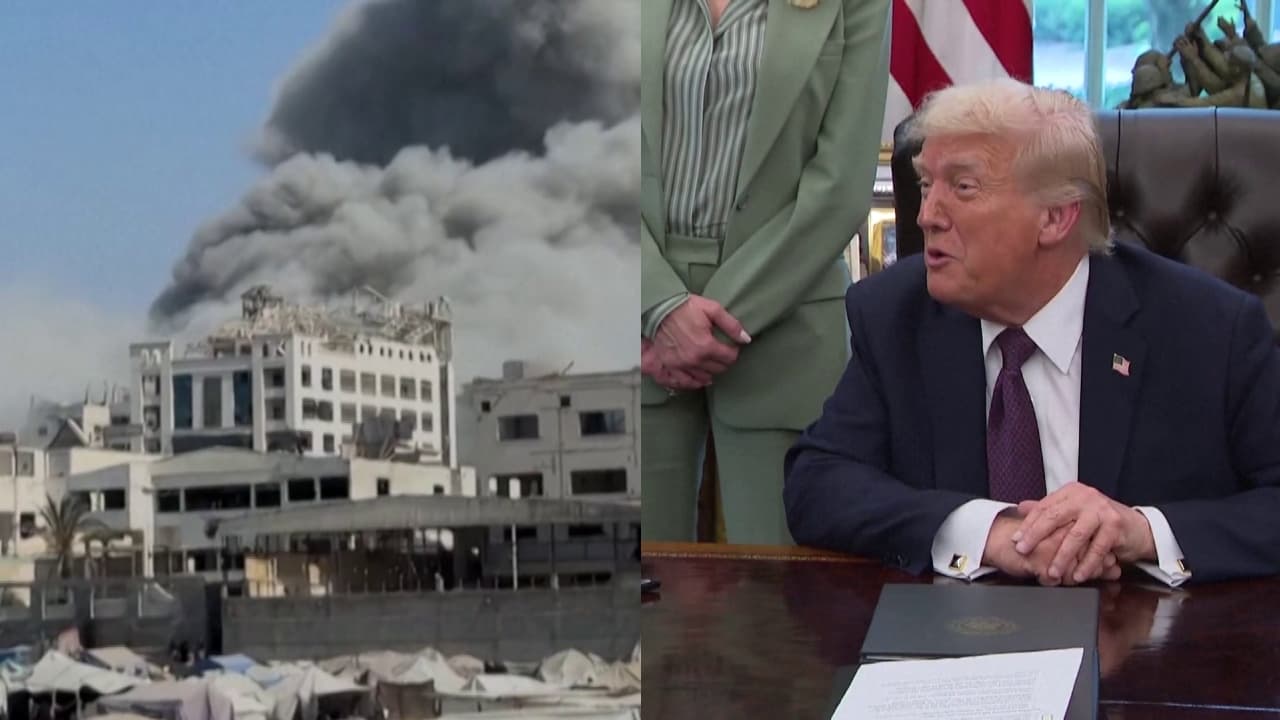US President Donald Trump has given Hamas three to four days to respond to his 20-point peace plan for Gaza. The proposal demands a ceasefire, release of hostages within 72 hours, Hamas disarmament, and Israel’s gradual withdrawal.
US President Donald Trump has set a strict three to four-day deadline for Hamas to respond to his newly unveiled 20-point peace plan for Gaza. Speaking to reporters outside the White House, Trump warned that if Hamas refuses to accept the proposal, it will face a ‘very sad end’.
Scroll to load tweet…
Trump said the peace plan already has the backing of Israel, Arab nations, and other Muslim-majority countries. “We’re just waiting for Hamas. Hamas is either going to be doing it or not. If it’s not, it’s going to be a very sad end,” he stated firmly.
The comments came a day after Trump and Israeli Prime Minister Benjamin Netanyahu jointly presented the proposal.
Key features of Trump’s 20-point plan
The peace plan calls for:
- An immediate ceasefire in Gaza
- The release of Israeli hostages by Hamas within 72 hours
- The complete disarmament of Hamas
- A gradual withdrawal of Israeli forces from Gaza
- The creation of a transitional authority to govern Gaza, headed temporarily by Trump himself
- An international ‘Board of Peace’, possibly including former UK Prime Minister Tony Blair, to assist in rebuilding Gaza and monitoring security
Trump described the announcement as a ‘beautiful day, potentially one of the greatest days ever in civilisation’.
Hamas begins internal consultations
According to a Palestinian source quoted by AFP, Hamas has begun consultations with both political and military leaders inside Gaza and abroad. “The discussions could take several days due to the complexities,” the source said.
While Hamas has not formally rejected the proposal, the group is reportedly divided on certain conditions, especially disarmament and the transitional authority structure.
Qatar’s foreign ministry also confirmed that Hamas is studying the proposal ‘responsibly’.
Netanyahu backs plan but issues warning
At the joint press event, Israeli Prime Minister Benjamin Netanyahu voiced cautious support for Trump’s initiative, saying: “I support your plan to end the war in Gaza, which achieves our war aims. But if Hamas rejects your plan, Mr President, or if they supposedly accept it and then act against it, then Israel will finish the job by itself.”
Scroll to load tweet…
Netanyahu also made it clear that Israel would ‘forcibly resist’ any attempt to impose a Palestinian state that undermines its security.
Starmer welcomes Trump’s initiative
UK Prime Minister Keir Starmer welcomed the plan during his address at the Labour Party conference in Liverpool. He said: “I strongly support efforts to end the fighting, release every hostage and urgently scale up aid into Gaza. All sides must now come together to bring this initiative into reality.”
Starmer highlighted the humanitarian crisis in Gaza and underlined the need for both immediate relief and long-term solutions.
War background and toll
The war in Gaza began after Hamas’s attack on Israel on October 7, 2023, which killed 1,219 people. In response, Israel launched a massive military campaign.
Since then, much of Gaza has been reduced to rubble. According to Gaza’s health ministry, 66,055 Palestinians have been killed in Israeli strikes. Millions more have been displaced, with severe shortages of food, medicine, and electricity worsening the humanitarian situation.
Over the next few days, Hamas is expected to complete its internal consultations and provide an official response to Trump’s plan. If the group accepts, talks could open a pathway to ending the nearly two-year-long war.
However, if Hamas refuses, Trump has pledged ‘full backing’ for Israel to take independent action. Netanyahu has already made clear that Israel is prepared to escalate its campaign if needed.
Diplomats say even if an agreement is reached, ensuring its survival will be the real challenge, as several issues, including Palestinian statehood, long-term governance, and rebuilding Gaza, remain unresolved.
(With inputs from agencies)
